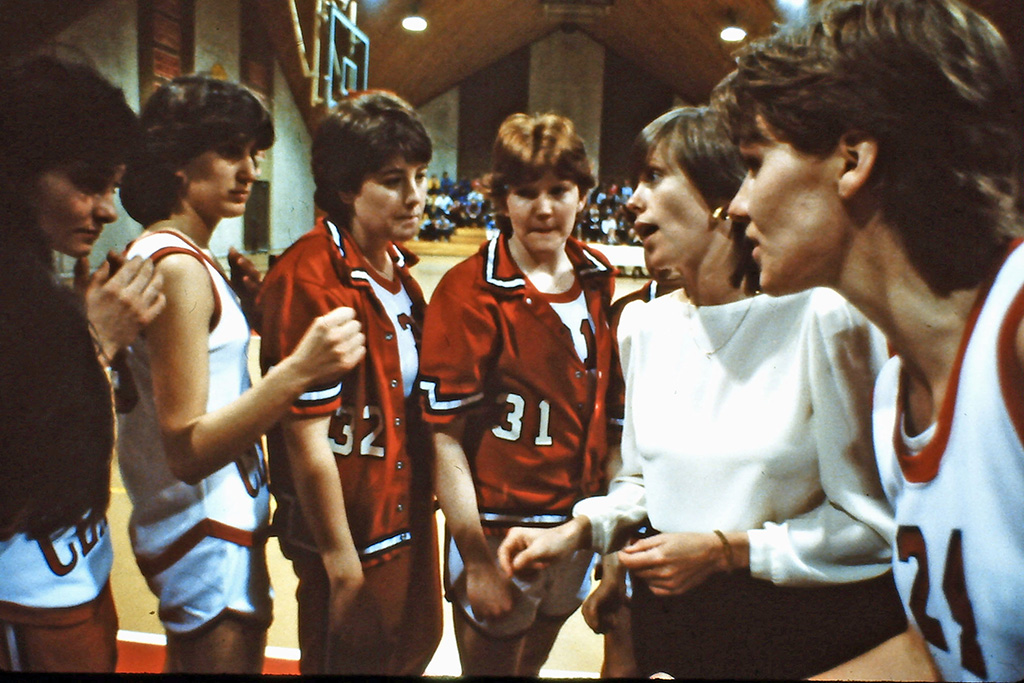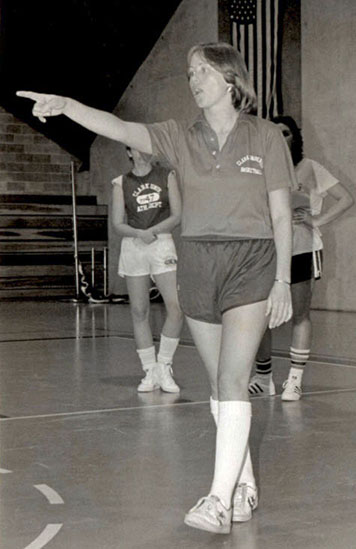Barbara Stevens gets the call for the Hall

Barbara Stevens was the first New England women’s basketball coach to reach 500 career wins. Then she was the first Division II coach to reach 600 wins … then the first to reach 700 wins.
By the time she retired from coaching in 2020, Stevens had accrued a lifetime record of 1,058-291, making her the fourth winningest women’s basketball coach in NCAA history. In 2020, Stevens was elected into the Naismith Memorial Basketball Hall of Fame, joining an illustrious class of inductees that included former NBA stars Tim Duncan, Kevin Garnett, and the late Kobe Bryant. Because of the pandemic, their enshrinement was postponed to May 15, 2021.
Watch the 2020 Naismith Memorial Basketball Hall of Fame Enshrinement Ceremony live on ESPN on Saturday, May 15, from 5:30 to 8 p.m.
Stevens spent 34 years at Bentley University and had a stint at UMass. But her career was launched at Clark, where after a year as assistant coach she prowled the Kneller sidelines as head coach from 1977 to 1983, earning a 123-42 record and laying the foundation for her historic career. We caught up with Stevens to learn about her time at Clark and her reaction to the news that she’s a Hall of Famer.

Was election to the Hall of Fame a surprise?
It was a complete shock! In 2019, I was named a finalist for selection to the Hall of Fame — and was incredibly honored to even be a finalist. After all, induction into the Naismith Memorial Basketball Hall of Fame was something I never ever dared to dream. When I got the call from the executive director and heard the word “congratulations,” I couldn’t believe it — I was stunned and very emotional. I’m still in disbelief.
What moments of pride stand out from your years with the Cougars?
Clark University gave me my start in coaching. In the fall of 1976, Pat Hassett, former women’s athletic director at Clark, took a chance and hired a 23-year-old recent college graduate with no coaching experience to lead the women’s basketball team. Things like that don’t happen these days, I can assure you, so I was extremely fortunate. I had to learn on the job, and luckily had a great group of student-athletes in my first couple of years. We had some wonderful experiences I will always remember and cherish. My former Clark players are still some of my very good friends.
When we started, we were not at the level of a competitive DIII team. However, we were fortunate that some very good players came to Clark and wanted to play for the team. With talented players and great assistant coaches, and an administration that fully supported what we were trying to do, we were able to experience a high level of success, culminating in our two consecutive appearances in the NCAA DIII Final Four in 1985 and ’86.
I remember those early days of my coaching career at Clark with great fondness. The people who were a part of my life then — not only my players but the athletic staff at Clark — were extremely supportive and remain very special to me. My seven years at Clark helped me understand how much I loved coaching and helped shape my philosophy: “We must know the person first before we coach the athlete.”
What are your retirement plans?
Even though it was a difficult decision, I knew it was the right time to step away from coaching and I feel at peace — however, I would not recommend retiring during a pandemic! Many plans for retirement have been put on hold, but I know that at some point, hopefully soon, I can start checking off the items on my bucket list.
I have done some podcasts and interviews for the WBCA and hope to continue to help that organization in any way I can. I’m content to decompress from coaching right now, but know that I will want to use my expertise in some way when it is safe to do so.


